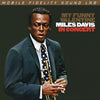



Miles Davis - My Funny Valentine (Ultra Analog, Half-speed Mastering)
ORDER LIMITED TO ONE ITEM PER CUSTOMER
Miles Davis – trumpet [click here to see more vinyl featuring Miles Davis]
George Coleman – tenor saxophone [click here to see more vinyl featuring George Coleman]
Herbie Hancock – piano [click here to see more vinyl featuring Herbie Hancock]
Ron Carter – double bass [click here to see more vinyl featuring Ron Carter]
Tony Williams – drums
1 LP, gatefold jacket
Limited numbered edition
Mastered from the 1/4" / 15 IPS Analog Copy to DSD 64 to Analog Console to Lathe
Half-speed Mastering
Gain 2™ Ultra Analog
Heavy Press : 180g
Record color : black
Speed : 33 RPM
Size : 12'’
Stereo
Live
Record Press : RTI
Label : MOFI
Original Label : Columbia
Recorded live on February 12, 1964 at Philharmonic Hall, Lincoln Center, New York City
Produced by Teo Macero
Originally released in 1965
Reissued in 2015
Tracks:
Side A :
My Funny Valentine
All of You
Side B :
Stella By Starlight
All Blues
I Thought About You
Reviews :
"Miles Davis' concert of February 12, 1964, was divided into two LPs, with all of the ballads put on My Funny Valentine. These five lengthy tracks (specifically, "All of You," "Stella by Starlight," "All Blues," "I Thought About You," and the title cut) put the emphasis on the lyricism of Davis, along with some strong statements from tenor saxophonist George Coleman and freer moments from the young rhythm section of pianist Herbie Hancock, bassist Ron Carter, and drummer Tony Williams. This hour-long LP complements the up-tempo romps of Four & More." AllMusic Review by Scott Yanow
Ultra Analog™ : The GAIN 2 Ultra Analog™ Series stems from the use of the Gain 2 system, mastered at half speed from the original master tapes where possible, capturing and uncovering as before undiscovered sonic information.
Half-speed mastering. In half-speed mastering, the whole process is slowed down to half of the original speed. A typical 33 1/3 rpm record is cut at 16 2/3 rpm. The source material is also slowed down (reducing the pitch in the process) meaning the final record will still sound normal when played back. Slowing the whole process down allows more time, which means the end result sounds better and is more efficient — allowing engineering to minimize the effects of inherent limitations within the vinyl format. The result is a more accurate and more open high-frequency response in the half speed vinyl when compared with a normal speed recording.
Ratings :
AllMusic : 4,5 / 5 , Discogs : 4,45 / 5


